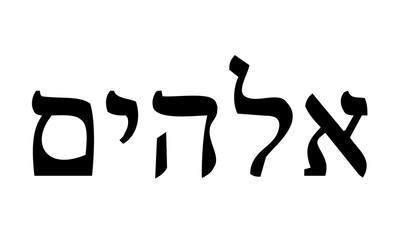Plurality In The Hebrew Word For “God”?
Asher Chee |
Genesis 1:1 In the beginning, God created the heavens and the earth.
In the Jewish Scriptures (i.e., the “Old Testament”), the usual Hebrew word for “God” is elohim (אֱלֹהִים). On its own, elohim is a plural form noun. This has misled many to think that it somehow indicates a plurality in God.
The Plural of Excellence
In Biblical Hebrew, the plural usually denotes plurality of number, i.e., multiple instances of that noun. Since elohim is plural in form, it is used in many contexts to refer to multiple “gods”. Consider the uses of elohim in the following passages:
Exodus 20:3 There shall not be to you other gods [elohim] before me.
Psalm 82:6 ESV I said, “You are gods [elohim], sons of the Most High, all of you; nevertheless, like men you shall die, and fall like any prince.”
However, in Hebrew, the plural does not always denote plurality of number. Sometimes, the plural form of a noun could be the plural of excellence without any notion of numerical plurality.
This happens for other Hebrew nouns as well. For example, the Hebrew word adon (אָדוֹן) means “lord; master”. Its plural form is adonim (אֲדוֹנִים). Because adonim is plural in form, it often refers to multiple “lords” or “masters”. However, it is also used in the Jewish Scriptures to refer to singular persons. For example,
- Abraham is referred to as the “lord; master” of the servant, using the plural noun adonim (Genesis 24:9, 10, 51).
- Potiphar is referred to as the “lord; master” of Joseph, using the plural noun adonim (Genesis 39:2, 3, 7, 8, 16, 19, 20).
- The “lord; master” of a concubine is referred to by the plural noun adonim (Judges 19:26, 27).
- David called Saul the “lord; master” of the men of Jabesh-gilead (2 Sam. 2:5, 7), using the plural noun adonim.
- Nathan called David “our lord; master”, using the plural noun adonim (1 Kings 1:11).
Does the plural form noun adonim indicate plurality in any of these persons? Of course not. Rather, these plurals are used to indicate excellence.
Elohim as a Singular “God”
Through the plural of excellence, elohim became the normal Hebrew word for even a singular “god”. Throughout the Jewish Scriptures, elohim is used for singular entities without any notion of plurality. Consider the following use of elohim:
1 Samuel 28:12–14 ESV When the woman saw Samuel, she cried out with a loud voice. And the woman said to Saul, “Why have you deceived me? You are Saul.” 13 The king said to her, “Do not be afraid. What do you see?” And the woman said to Saul, “I see a god [elohim] coming up out of the earth.” 14 He said to her, “What is his appearance?” And she said, “An old man is coming up, and he is wrapped in a robe.” And Saul knew that it was Samuel, and he bowed with his face to the ground and paid homage.
When the woman saw Samuel, she reported that she was seeing an elohim. Does this indicate that Samuel had a plurality within himself? Of course not. Rather, in this passage, elohim means “spiritual being”, and refers to the singular entity, Samuel.
Singular or Plural?
Since elohim could be either singular or plural in number, how can we determine which is meant in a given passage? In most cases, the grammar of the text can help. Consider the use of elohim in Genesis 1:1:
Genesis 1:1 In the beginning, God [elohim] created the heavens and the earth.
The Hebrew verb for “created” here is in a form which implies a singular agent. In other words, the noun performing the action of the verb “created” here—namely, elohim—is a singular entity. Therefore, elohim here must be a singular entity, and so it would not be correct to translate this verse as, “In the beginning, gods created the heavens and the earth.”
Conclusion
Elohim is the normal Hebrew word for “god”, and was used to refer not only to the one true God, but also to individual “gods” and other individual gods-by-extension like spiritual beings.

